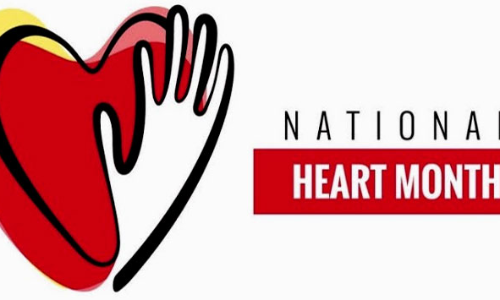Parents!! Warn your children about the

February is a Heart Health Month Are you planning on making any improvements to your hearts health Start now and celebrate those wins during heart health month
February is a Heart Health Month. Are you planning on making any improvements to your hearts health? Start now and celebrate those wins during heart health month.
Folks! Heart disease doesn't happen just to older adults. It is happening to younger adults and children more and more often. This is partly because the conditions that lead to heart disease are happening at younger ages. February is Heart Month, the perfect time to learn about your risk for heart disease and the steps you need to take now to help your heart.
WHO COULD BE AT A RISK?
Many of the conditions and behaviors that put people at risk for heart disease are appearing at younger ages:
 HIgh Blood pressure: Millions of Americans of all ages have high blood pressure, including millions of people in their 40's and 50's. About half of people with high blood pressure don't have it under control. Having uncontrolled high blood pressure is one of the biggest risks for heart disease and other harmful conditions, such as stroke.
HIgh Blood pressure: Millions of Americans of all ages have high blood pressure, including millions of people in their 40's and 50's. About half of people with high blood pressure don't have it under control. Having uncontrolled high blood pressure is one of the biggest risks for heart disease and other harmful conditions, such as stroke.
 High blood Cholesterol: High cholesterol can increase the cardiac risk. Hacing diabetes and obesity, smoking, eating unhealthy foods, and not getting enough physical activity can all contribute to unhealthy cholesterol levels.
High blood Cholesterol: High cholesterol can increase the cardiac risk. Hacing diabetes and obesity, smoking, eating unhealthy foods, and not getting enough physical activity can all contribute to unhealthy cholesterol levels.
 Smoking: More than quater population in U.S adults are current smokers, and among those thousands are young smokers who smoke each day. Smoking damages the blood vessels and can cause heart disease.
Smoking: More than quater population in U.S adults are current smokers, and among those thousands are young smokers who smoke each day. Smoking damages the blood vessels and can cause heart disease.
The other conditions that affect your heart are :
 Obesity: Carrying those extra pounds puts stress on the heart. More than 1 in 3 Americans- and nearly 1 in 6 children ages 2 to 19 has obesity.
Obesity: Carrying those extra pounds puts stress on the heart. More than 1 in 3 Americans- and nearly 1 in 6 children ages 2 to 19 has obesity.
 Diabetes: Diabetes causes sugar to build up in the blood. This can damage blood vessels and nerves that help control the heart muscle. Nearly 1 in 10 people in the united state has diabetes.
Diabetes: Diabetes causes sugar to build up in the blood. This can damage blood vessels and nerves that help control the heart muscle. Nearly 1 in 10 people in the united state has diabetes.
 Physical inactivity: Staying physically active helps the heart and blood vessels healthy. Only 1 in 5 adults meets the physical activity guidelines of getting 150 minutes a week of moderate-intensity activity.
Physical inactivity: Staying physically active helps the heart and blood vessels healthy. Only 1 in 5 adults meets the physical activity guidelines of getting 150 minutes a week of moderate-intensity activity.
 Unhealthy eating patterns: Most Americans, including children, eat too much sodium(salt), which increases blood pressure. Replacing foods high in sodium with fresh fruits and vegetables can help lower blood pressure.
Unhealthy eating patterns: Most Americans, including children, eat too much sodium(salt), which increases blood pressure. Replacing foods high in sodium with fresh fruits and vegetables can help lower blood pressure.
But only 1 in 10 adults is getting enough fruits and vegetables each day. Diet high in Trans-fat, Saturated fat, and added sugar increases the risk factor for heart disease.
Warning signs that may signal a Cardiovascular issue in youth include:
.Dizziness with physical exertion.
.Inability to physically keep up with, or becoming out of breath sooner than, others of the same age.
.Fainting
. Turning blue around the gums or tongue.
If one or more of these symptoms is present, it could signal the onset of sudden cardiac arrest.

